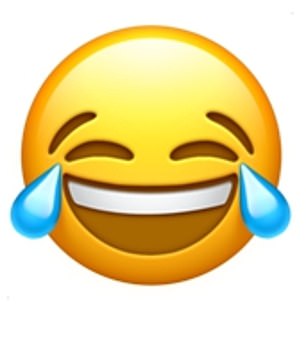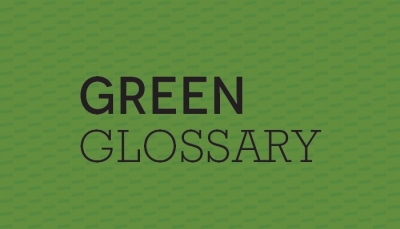How do you show laughter in writing?

Do you know what the following words have in common? Guffaw, snigger, chuckle, chortle, cackle and crack up? They are all words for laughter! Different words are available to describe different forms of laughter. They go from LOL a popular acronym, to the number 555. In between are words such as snicker and snort as well as idioms, for example: "The clown kept the audience in stitches with his antics." All words that stand for laughter have a history of their origin, or etymology. A lot of the regular words came down to us from Latin, Greek, German and other European languages. Now that we do most of our communication online, we have invented ways of creating words to align with our online life.
[1] The laughter emoji
In the mid-2010s, letters gave way to emojis. Two emojis that stood for laughter became extremely popular, and were attached to texts in social media in a big way. Do you know which ones they are? The face with tears of joy and rolling on the floor laughing. According to reports, Face with Tears of Joy' is consistently one of the most used emojis across the globe. and is used to express different degrees and types of happiness. The Rolling on the Floor Laughing emoji is meant to communicate something even more hilarious. Often, they are used together to express laughter online and in text messages.
[2] LOL (or lol)
This is one of the commonest ways to express laughter online. It is an acronym standing for "laughing out loud". It has been around since the time message boards appeared online in the 1980s. On message boards, conversations were conducted through typing, so typers had to come up with short forms. They made an acronym with the first letters of the words in the phrase "laughing out loud." Soon LOL became a word that everyone understood, and this gave birth to other contractions.
[3] Luiz and lel
Lulz is based on a colloquial pronunciation and informal spelling of the plural form of LOL or LOLS. Lulz usually refers to laughter that comes at someone else's expense.
Lel is a playful version of LOL- used generally in response to comments that troll. It emerged on the popular image-board site 4chan in the mid-2000s. Why the E? Just a random substitute for the O in LOL. Today some people pair lel with a trollface, and form a meme.
[4] ROFL and roficopter
The rolling on the floor laughing emoji was, you can imagine, inspired by its acronym ROFL This acronym rhymes with "awful" when you pronounce it as a word, and came into being in 1989. In the 1990s, ROFL was combined with LOL in ROTFLOL - rolling on the floor laughing, laughing out loud. Wow, whatever makes you laugh that much must be quite a joke!
Another version of ROFL is the roflcopter - a mix of helicopter and ROFL. The term is supposed to have been coined in 2003 by moderators on a forum for World of Warcraft III, an online game. The game, if you remember, had a vehicle called the gyrocopter. Gamers were asked to use roflcopter as a response to something they found extremely funny. For instance, Man, roflcopter, that was hilarious!" ROFL can also be ROTF (rolling on the floor) and ROTFL.
[5] MDR and PTDR
The French have their own acronyms and abbreviations for texting. When it comes to laughing, they type MDR which stands for mort de rire, or "dying of laughter."
Instead of ROFL they use the acronym PTDR short for pété de rire, an expression that translates to "broken with laughter." Go ahead, impress your friends with your “knowledge” of French!
[6] XD or SD
Before emojis, we used emoticons like XD or xD to convey laughter. XD/XD are supposed to resemble someone's eyes scrunched closed and mouth open wide in laughter. These were first seen in the 1990s and early 2000s. When emojis became popular and widespread, XD was largely dropped.
[7] Kek
Kek is an online term, similar in meaning to LOL or haha. Online gamers were the first to use it. It was launched in Blizzard's 1998 real-time strategy game Starcraft. Korean gamers could not add the Korean writing system, so the Korean equivalent to the English hahaha, became written as "kekeke." Kek is also the name of an ancient Egyptian deity often represented as a humanoid figure with the head of a frog. In 2015, an anonymous user on 4chan posted information and pictures of Kek, the god. Users compared the god to Pepe the Frog, an innocent cartoon character. The use of the term has since been stopped.
[8] wwww
Wwww is pronounced "wah-rah-wah-rah wah-rah-wah-rah." It is the Japanese equivalent of the English hahahaha. The use of wwww to represent laughing comes from the Japanese wara, which means "to laugh." In the 1990s and 2000s, the Japanese adapted the kanji (a Chinese pictographic symbols used in Japanese writing) to denote laughter (similar to LOL). People eventually found it easier, though, to use the letter w, from the romanji (writing in Japanese with Roman letters), wara. Then someone pointed out that all those Ws looked like blades of grass, so people began to refer to wwww as kusa, Japanese for "grass." And just like haha or lol, a shortened w can be used sarcastically: "Haha or w, real funny. Not."
[9] 233
Why use the Latin alphabet to denote laughter, asked some on social media platforms. Why not do away with alphabets altogether? Some Chinese speakers use the number 233 as shorthand for laughter. This comes from the popular Chinese online forum Mop.com, which uses emoji-like characters. On Mop, the 233rd character is a GIF of a small, furry creature pounding the ground in laughter. As a result, 233 spread as shorthand for laughter. As in many forms of online laughter, the longer the string of numbers, the more enthusiastic and long-drawn the laughing. So, if 233 means "haha." 2333333333 is more like "hahahahahaha."
[10] Jaja and jeje
These two are from Spanish. In Spanish, J is usually pronounced with a strong H sound. The name José, for instance, is Hosé and mija is mee-hah. If you ask a group of Spanish speaking people to write "haha", they will write "jaja." A string of hahahaha (for laughter) will be jajajajaja for a Spanish speaker. Some will write jejejeje instead of jajajaja to refer to trollish, mocking laughter just as English speakers will write hehehe for snide laughter.
Picture Credit : Google



